Resume
Intern Doctor Cover Letter Examples

May 29, 2025
|
12 min read
Perfect your intern doctor cover letter with these heart-felt tips and ensure your application pulses with professionalism. Learn what to include and how to make your skills stand out to potential hospitals and clinics.
4.70 Average rating
Rated by 348 people
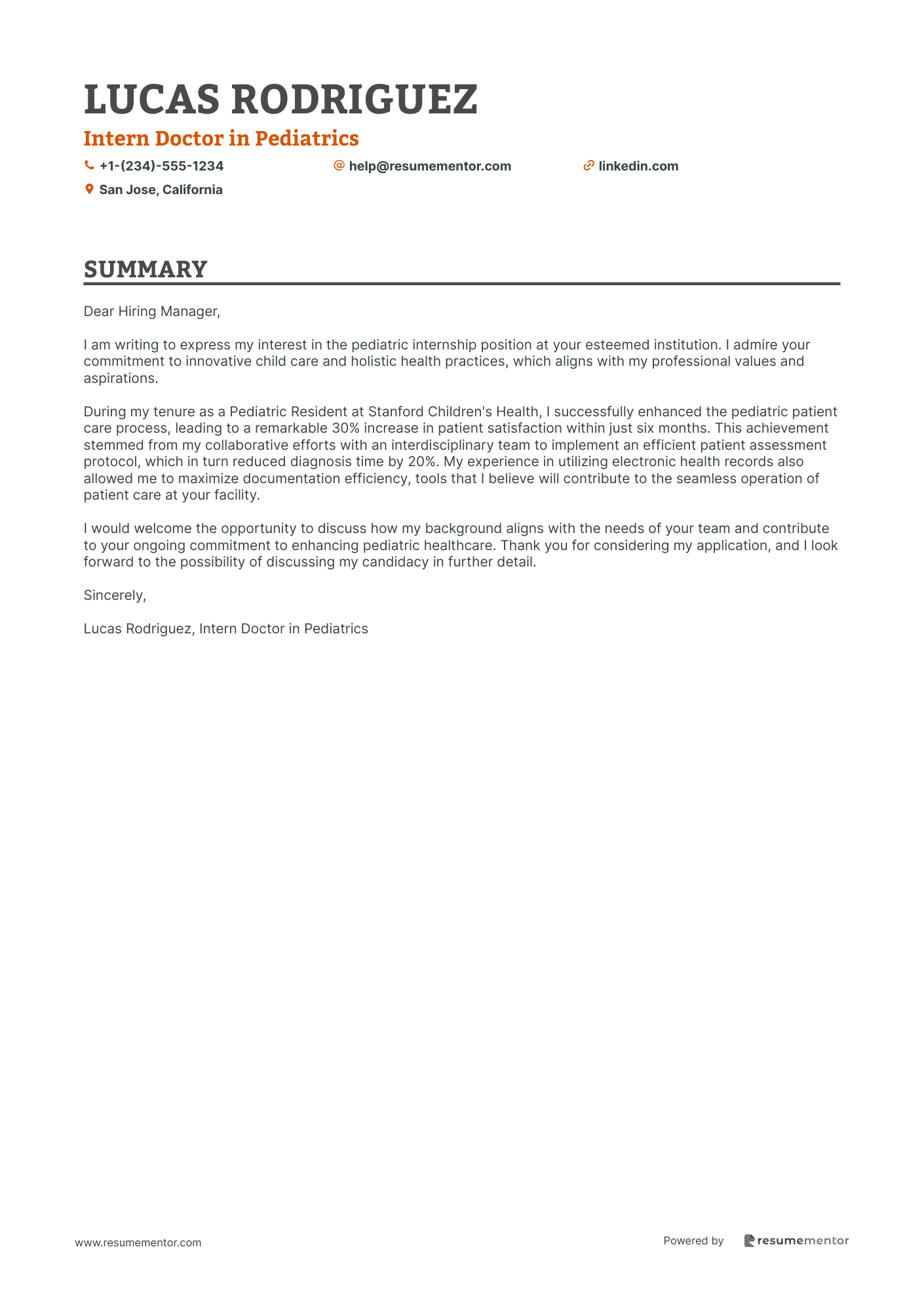
Intern Doctor in Pediatrics
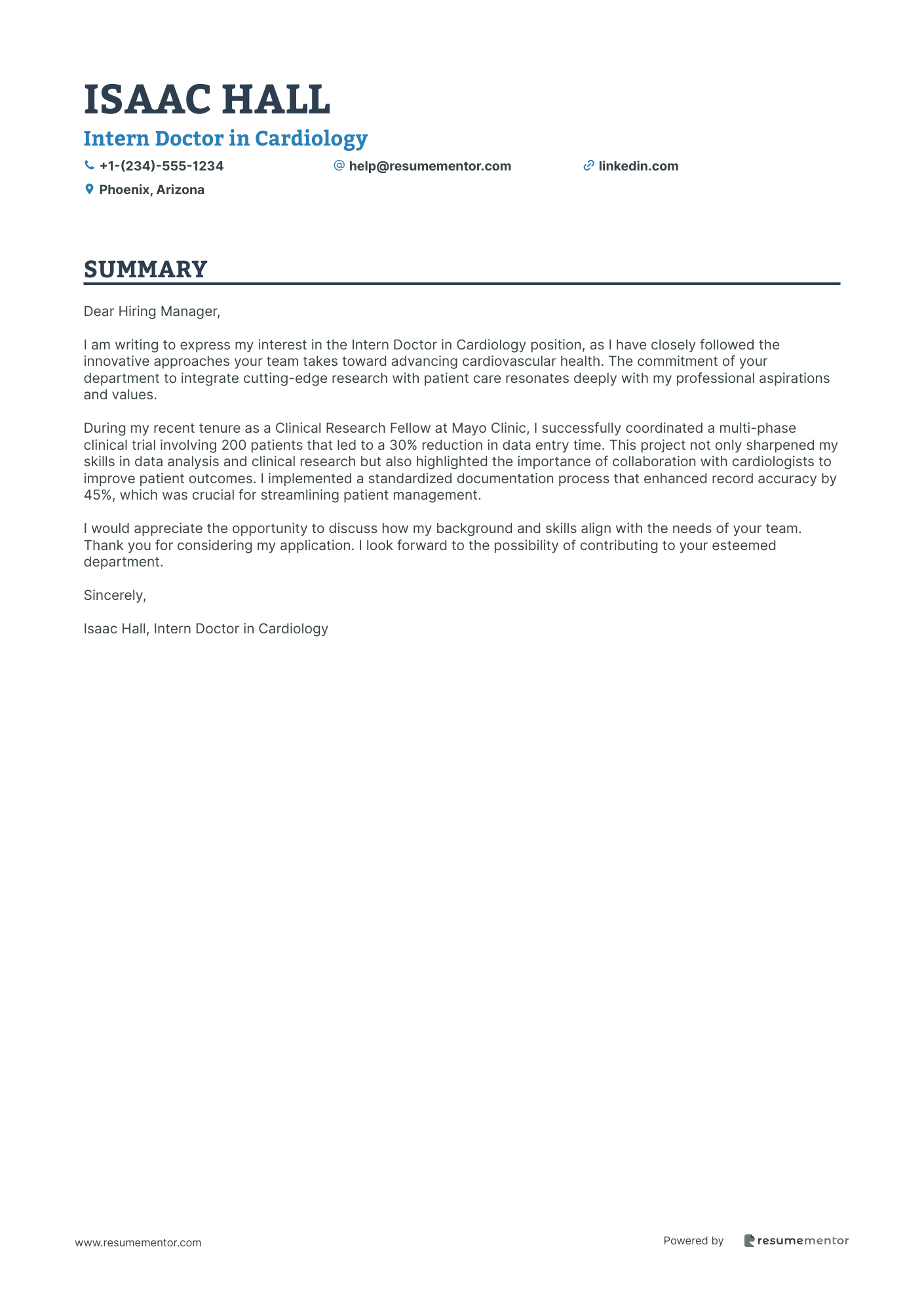
Intern Doctor in Cardiology
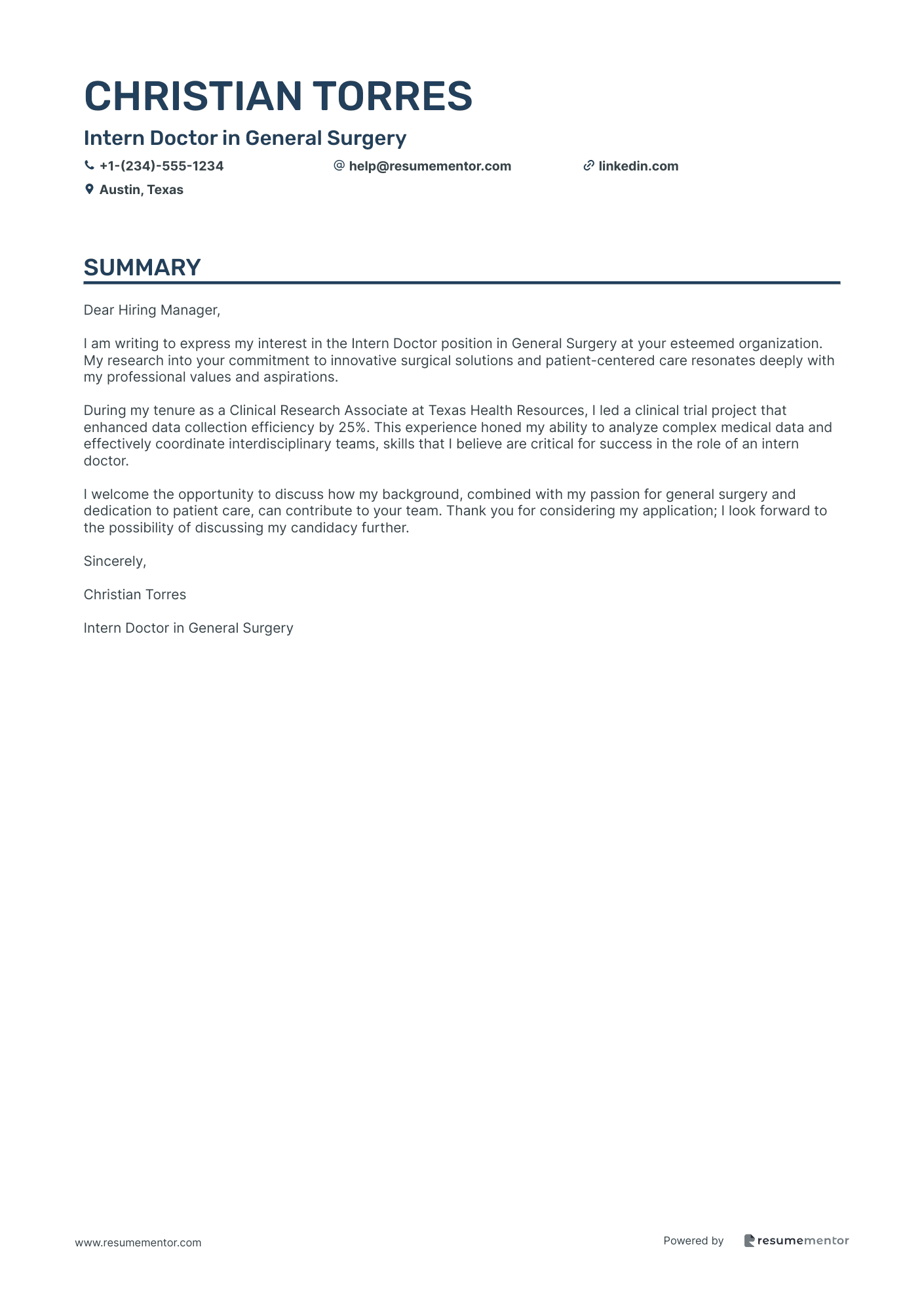
Intern Doctor in General Surgery
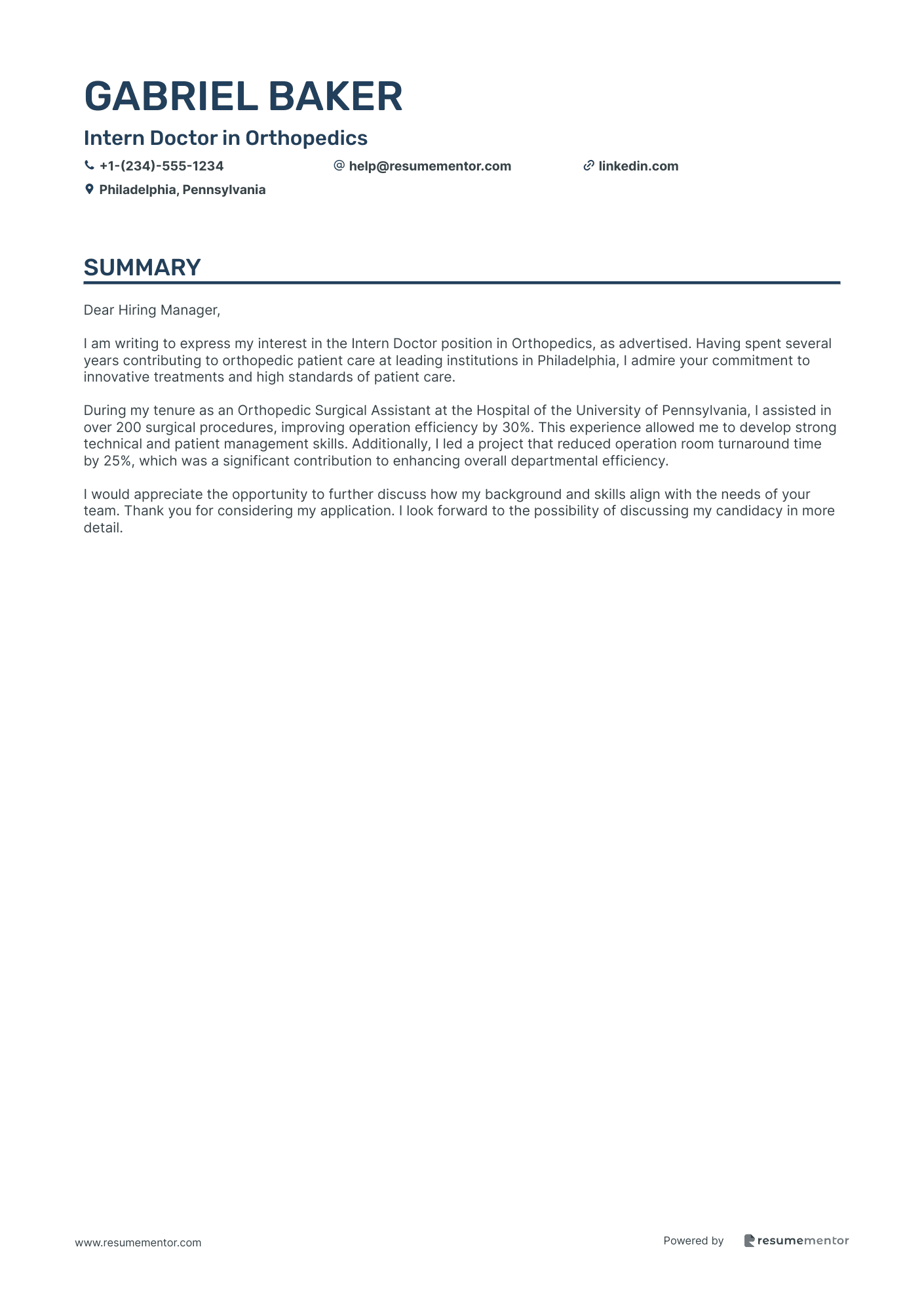
Intern Doctor in Orthopedics
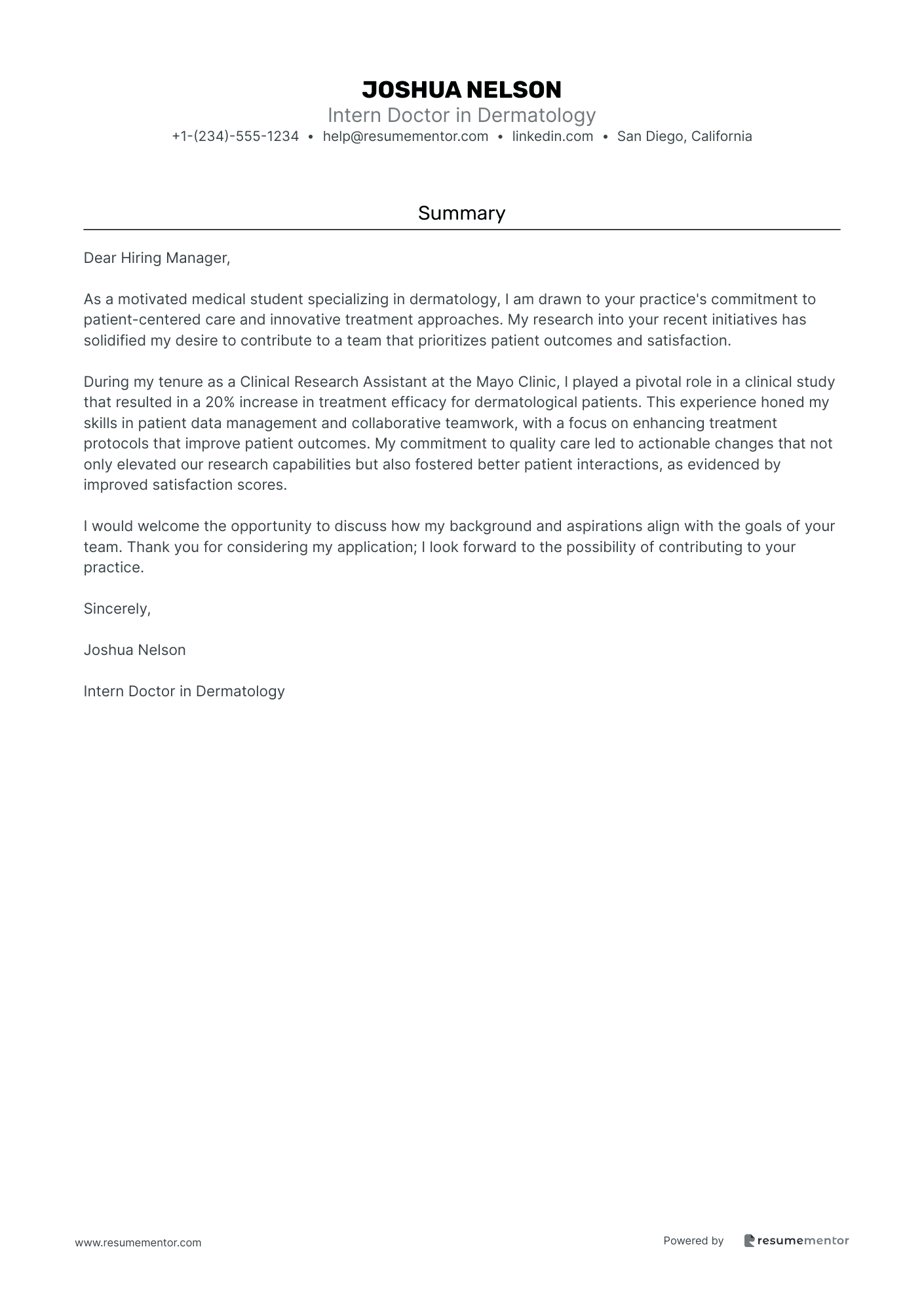
Intern Doctor in Dermatology
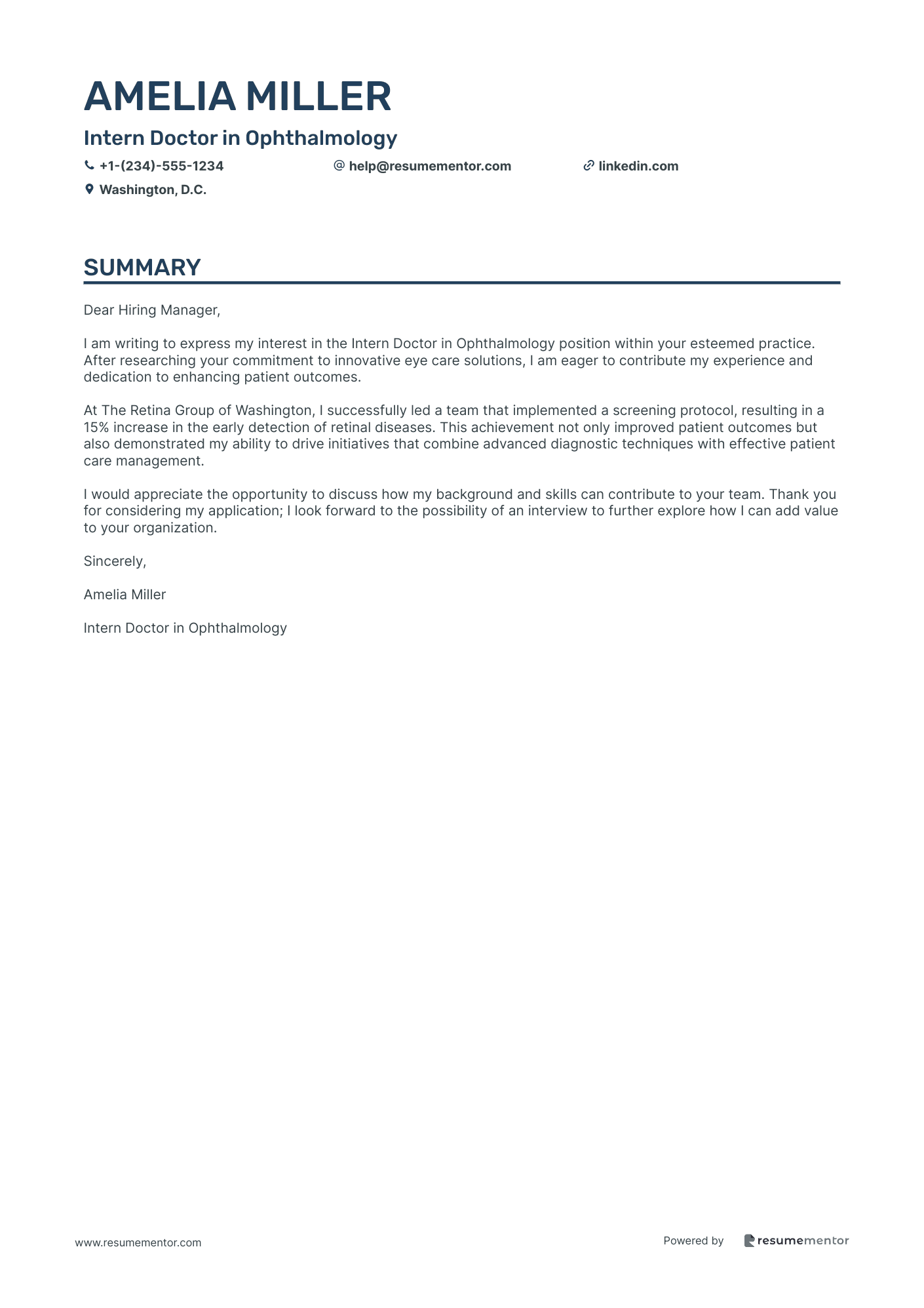
Intern Doctor in Ophthalmology
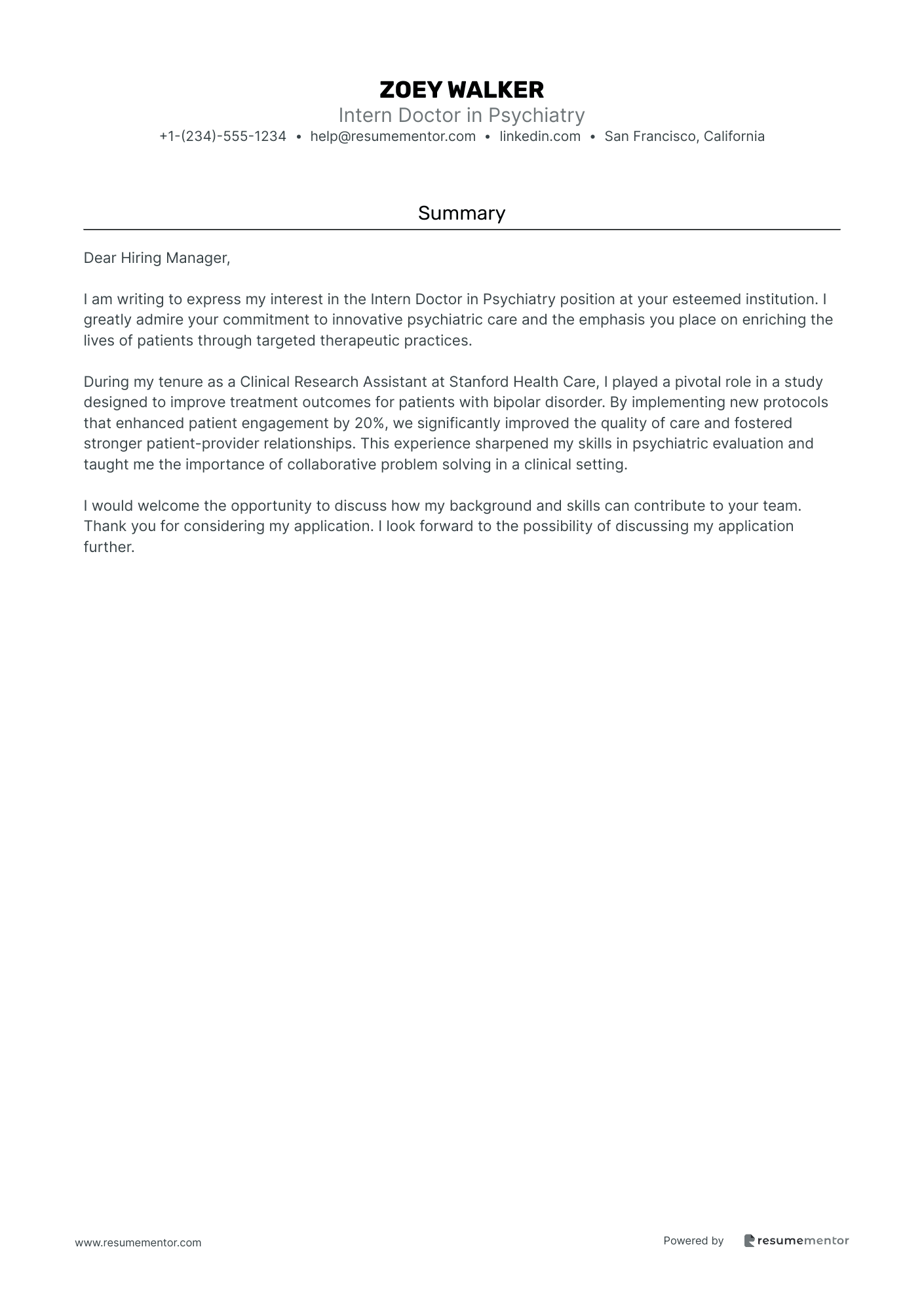
Intern Doctor in Psychiatry
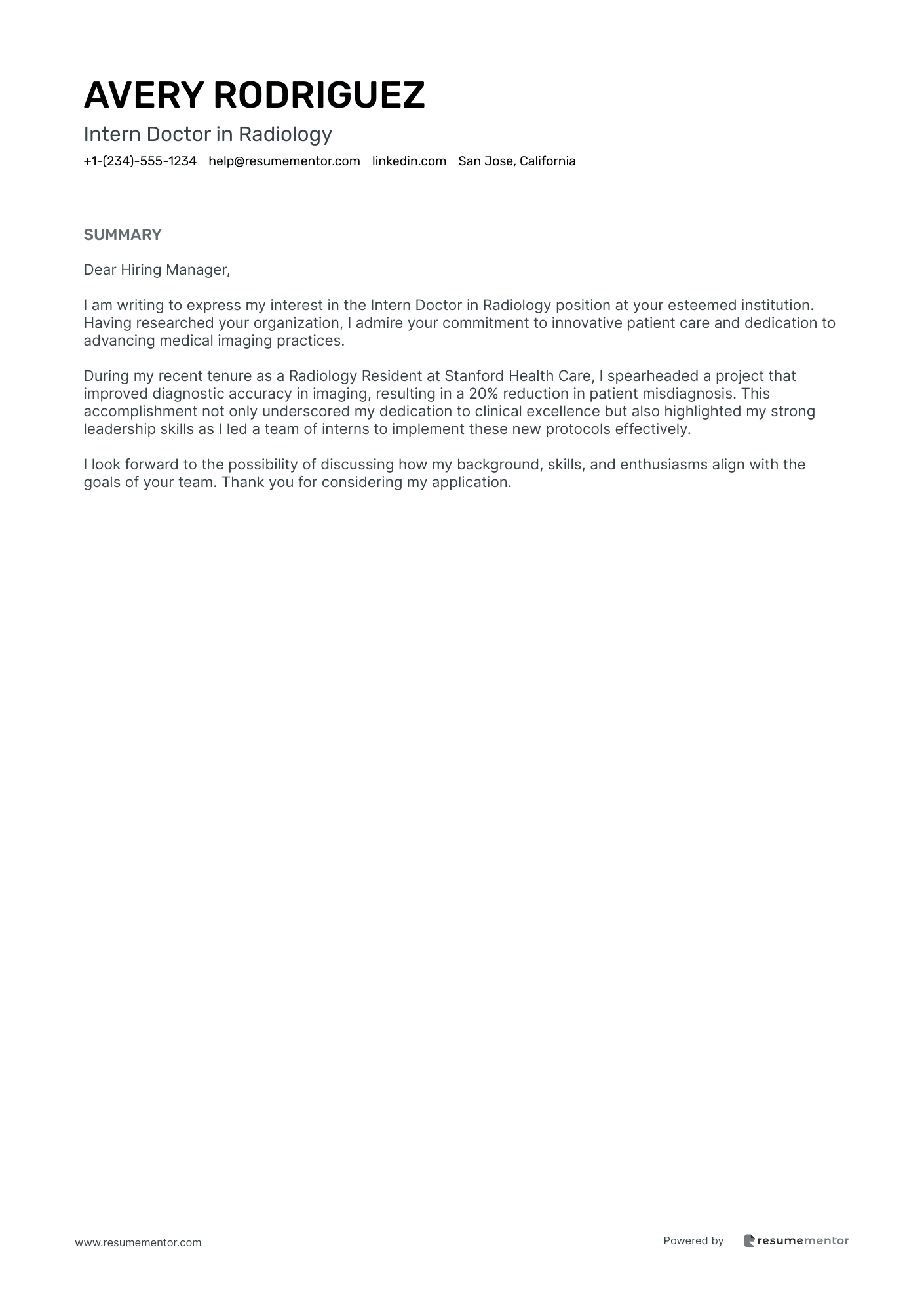
Intern Doctor in Radiology
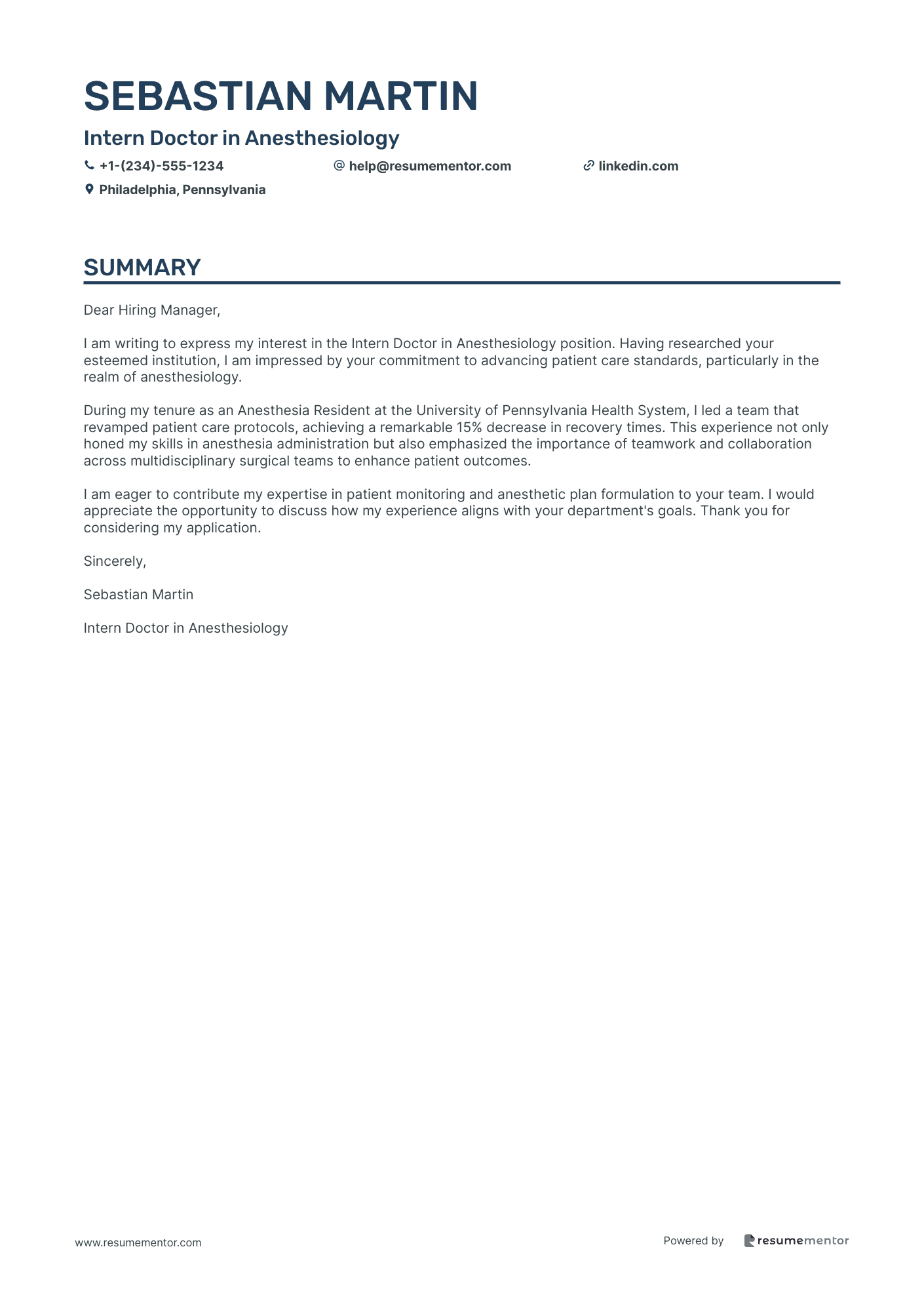
Intern Doctor in Anesthesiology
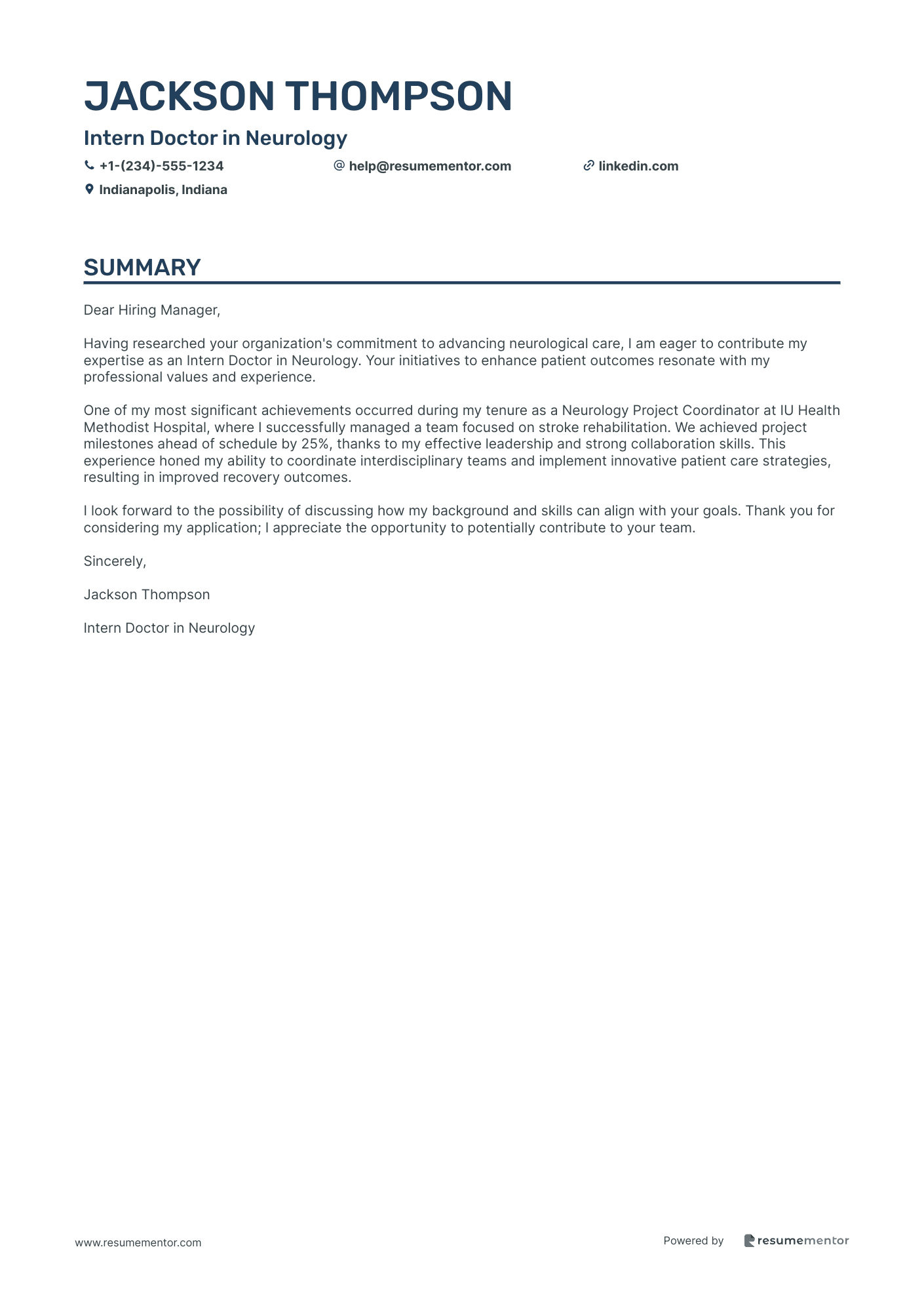
Intern Doctor in Neurology

Intern Doctor in Pediatrics cover letter sample
When applying for this position, it's important to showcase any relevant clinical experience, particularly with children. Highlight your coursework in pediatrics, child development, or healthcare ethics, and include any volunteer work with young patients or related organizations. Mention skills like empathy, patience, and strong observational abilities. Provide specific examples of how you supported children's care or educated families, using a clear 'skill-action-result' format. This will demonstrate your ability to communicate effectively and make a positive impact on young patients' well-being.
Lucas Rodriguez
Intern Doctor in Pediatrics
Summary
Dear Hiring Manager,
I am writing to express my interest in the pediatric internship position at your esteemed institution. I admire your commitment to innovative child care and holistic health practices, which aligns with my professional values and aspirations.
During my tenure as a Pediatric Resident at Stanford Children's Health, I successfully enhanced the pediatric patient care process, leading to a remarkable 30% increase in patient satisfaction within just six months. This achievement stemmed from my collaborative efforts with an interdisciplinary team to implement an efficient patient assessment protocol, which in turn reduced diagnosis time by 20%. My experience in utilizing electronic health records also allowed me to maximize documentation efficiency, tools that I believe will contribute to the seamless operation of patient care at your facility.
I would welcome the opportunity to discuss how my background aligns with the needs of your team and contribute to your ongoing commitment to enhancing pediatric healthcare. Thank you for considering my application, and I look forward to the possibility of discussing my candidacy in further detail.
Sincerely,
Lucas Rodriguez, Intern Doctor in Pediatrics
Intern Doctor in Cardiology cover letter sample
When crafting your cover letter, focus on any clinical rotations in cardiology or related fields. Highlight your ability to assess and manage cardiovascular conditions. If you have completed relevant workshops, such as advanced cardiovascular life support (ACLS) or echocardiography training, be sure to mention these. Discuss your teamwork and communication skills, as these are essential in a hospital setting. Provide specific examples where your actions led to improved patient outcomes or learning experiences, following the 'skill-action-result' structure to illustrate your impact.
Isaac Hall
Intern Doctor in Cardiology
Summary
Dear Hiring Manager,
I am writing to express my interest in the Intern Doctor in Cardiology position, as I have closely followed the innovative approaches your team takes toward advancing cardiovascular health. The commitment of your department to integrate cutting-edge research with patient care resonates deeply with my professional aspirations and values.
During my recent tenure as a Clinical Research Fellow at Mayo Clinic, I successfully coordinated a multi-phase clinical trial involving 200 patients that led to a 30% reduction in data entry time. This project not only sharpened my skills in data analysis and clinical research but also highlighted the importance of collaboration with cardiologists to improve patient outcomes. I implemented a standardized documentation process that enhanced record accuracy by 45%, which was crucial for streamlining patient management.
I would appreciate the opportunity to discuss how my background and skills align with the needs of your team. Thank you for considering my application. I look forward to the possibility of contributing to your esteemed department.
Sincerely,
Isaac Hall, Intern Doctor in Cardiology
Intern Doctor in General Surgery cover letter sample
When applying, it's essential to showcase your clinical rotations and any hands-on experience in surgical settings. Highlight your proficiency in basic surgical procedures and your familiarity with patient care protocols. Mention any relevant coursework, such as anatomy or surgical techniques, to demonstrate knowledge and commitment. Include examples of how your teamwork or leadership in medical projects improved outcomes or enhanced learning for your peers. Providing a clear narrative of your experiences will strengthen your application and illustrate your potential contribution to the team.
Christian Torres
Intern Doctor in General Surgery
Summary
Dear Hiring Manager,
I am writing to express my interest in the Intern Doctor position in General Surgery at your esteemed organization. My research into your commitment to innovative surgical solutions and patient-centered care resonates deeply with my professional values and aspirations.
During my tenure as a Clinical Research Associate at Texas Health Resources, I led a clinical trial project that enhanced data collection efficiency by 25%. This experience honed my ability to analyze complex medical data and effectively coordinate interdisciplinary teams, skills that I believe are critical for success in the role of an intern doctor.
I welcome the opportunity to discuss how my background, combined with my passion for general surgery and dedication to patient care, can contribute to your team. Thank you for considering my application; I look forward to the possibility of discussing my candidacy further.
Sincerely,
Christian Torres
Intern Doctor in General Surgery
Intern Doctor in Orthopedics cover letter sample
When crafting your cover letter, stress any clinical experience you've had in a hospital or clinic setting. Highlight your knowledge of orthopedic procedures or any rotations relevant to this specialty. It's important to mention your ability to work well in a team, as collaboration is key in this environment. If you've participated in research or community service related to orthopedic care, include those experiences. Use specific examples to demonstrate your commitment to patient care, underscoring how your contributions can improve patient outcomes and enhance team efficiency.
Gabriel Baker
Intern Doctor in Orthopedics
Summary
Dear Hiring Manager,
I am writing to express my interest in the Intern Doctor position in Orthopedics, as advertised. Having spent several years contributing to orthopedic patient care at leading institutions in Philadelphia, I admire your commitment to innovative treatments and high standards of patient care.
During my tenure as an Orthopedic Surgical Assistant at the Hospital of the University of Pennsylvania, I assisted in over 200 surgical procedures, improving operation efficiency by 30%. This experience allowed me to develop strong technical and patient management skills. Additionally, I led a project that reduced operation room turnaround time by 25%, which was a significant contribution to enhancing overall departmental efficiency.
I would appreciate the opportunity to further discuss how my background and skills align with the needs of your team. Thank you for considering my application. I look forward to the possibility of discussing my candidacy in more detail.
Intern Doctor in Dermatology cover letter sample
When applying, it’s important to showcase any hands-on experience with skin assessments or patient interactions. Highlight any relevant coursework in dermatology, pathology, or related fields, and detail any volunteer work in clinics or hospitals. Emphasizing your ability to work in a team and your strong interpersonal skills will also be beneficial. Additionally, mention specific techniques you have learned, such as biopsies or dermatoscopy, and how these skills can contribute to patient care. Use examples that demonstrate your commitment to continuous learning and patient outcomes.
Joshua Nelson
Intern Doctor in Dermatology
Summary
Dear Hiring Manager,
As a motivated medical student specializing in dermatology, I am drawn to your practice's commitment to patient-centered care and innovative treatment approaches. My research into your recent initiatives has solidified my desire to contribute to a team that prioritizes patient outcomes and satisfaction.
During my tenure as a Clinical Research Assistant at the Mayo Clinic, I played a pivotal role in a clinical study that resulted in a 20% increase in treatment efficacy for dermatological patients. This experience honed my skills in patient data management and collaborative teamwork, with a focus on enhancing treatment protocols that improve patient outcomes. My commitment to quality care led to actionable changes that not only elevated our research capabilities but also fostered better patient interactions, as evidenced by improved satisfaction scores.
I would welcome the opportunity to discuss how my background and aspirations align with the goals of your team. Thank you for considering my application; I look forward to the possibility of contributing to your practice.
Sincerely,
Joshua Nelson
Intern Doctor in Dermatology
Intern Doctor in Ophthalmology cover letter sample
When crafting your cover letter, emphasize any clinical rotations or internships related to eye care. Highlight your hands-on experience with diagnostic tools, such as visual field tests and OCTs. Mention relevant coursework in ophthalmology or anatomy to showcase your foundational knowledge. Detail any research projects you've participated in that pertain to eye health and include outcomes. Additionally, illustrate your ability to communicate complex medical information clearly to patients, supported by specific examples of successful interactions. Demonstrating your passion for eye care will strengthen your application.
Amelia Miller
Intern Doctor in Ophthalmology
Summary
Dear Hiring Manager,
I am writing to express my interest in the Intern Doctor in Ophthalmology position within your esteemed practice. After researching your commitment to innovative eye care solutions, I am eager to contribute my experience and dedication to enhancing patient outcomes.
At The Retina Group of Washington, I successfully led a team that implemented a screening protocol, resulting in a 15% increase in the early detection of retinal diseases. This achievement not only improved patient outcomes but also demonstrated my ability to drive initiatives that combine advanced diagnostic techniques with effective patient care management.
I would appreciate the opportunity to discuss how my background and skills can contribute to your team. Thank you for considering my application; I look forward to the possibility of an interview to further explore how I can add value to your organization.
Sincerely,
Amelia Miller
Intern Doctor in Ophthalmology
Intern Doctor in Psychiatry cover letter sample
When applying for this position, focus on any clinical experience in mental health settings. Highlight your ability to empathize and establish rapport with patients, as these qualities are essential in psychiatry. Include any relevant coursework in psychology or psychiatry, along with internships or volunteer work that demonstrate your commitment to this field. Use specific examples to illustrate how your understanding of mental health has positively impacted patients or enhanced team collaboration. Stick to a 'skill-action-result' format when detailing your experiences.
Zoey Walker
Intern Doctor in Psychiatry
Summary
Dear Hiring Manager,
I am writing to express my interest in the Intern Doctor in Psychiatry position at your esteemed institution. I greatly admire your commitment to innovative psychiatric care and the emphasis you place on enriching the lives of patients through targeted therapeutic practices.
During my tenure as a Clinical Research Assistant at Stanford Health Care, I played a pivotal role in a study designed to improve treatment outcomes for patients with bipolar disorder. By implementing new protocols that enhanced patient engagement by 20%, we significantly improved the quality of care and fostered stronger patient-provider relationships. This experience sharpened my skills in psychiatric evaluation and taught me the importance of collaborative problem solving in a clinical setting.
I would welcome the opportunity to discuss how my background and skills can contribute to your team. Thank you for considering my application. I look forward to the possibility of discussing my application further.
Intern Doctor in Radiology cover letter sample
When applying for this position, it’s important to highlight any clinical rotations or shadowing experiences in radiology. Include any relevant coursework, such as 'Imaging Techniques' or 'Radiologic Physics,' and specify the duration of these studies. Demonstrating familiarity with imaging software and safety protocols can set you apart. Use a 'skill-action-result' approach to showcase how your skills have assisted in diagnosing cases or improving patient care during internships or volunteer experiences. Mentioning teamwork and communication skills is also essential to show your ability to collaborate in a medical setting.
Avery Rodriguez
Intern Doctor in Radiology
Summary
Dear Hiring Manager,
I am writing to express my interest in the Intern Doctor in Radiology position at your esteemed institution. Having researched your organization, I admire your commitment to innovative patient care and dedication to advancing medical imaging practices.
During my recent tenure as a Radiology Resident at Stanford Health Care, I spearheaded a project that improved diagnostic accuracy in imaging, resulting in a 20% reduction in patient misdiagnosis. This accomplishment not only underscored my dedication to clinical excellence but also highlighted my strong leadership skills as I led a team of interns to implement these new protocols effectively.
I look forward to the possibility of discussing how my background, skills, and enthusiasms align with the goals of your team. Thank you for considering my application.
Intern Doctor in Anesthesiology cover letter sample
When crafting your cover letter, focus on any clinical rotations that involved anesthesia or surgical care. Highlight your knowledge of anesthesia techniques and patient monitoring. If you have participated in relevant workshops or training, include these details to demonstrate commitment to the specialty. Share instances where you contributed to patient safety or improved outcomes during procedures. Emphasizing teamwork and communication skills is essential, as they impact both patient care and collaboration with the surgical team. Use a clear 'skill-action-result' format to present your achievements effectively.
Sebastian Martin
Intern Doctor in Anesthesiology
Summary
Dear Hiring Manager,
I am writing to express my interest in the Intern Doctor in Anesthesiology position. Having researched your esteemed institution, I am impressed by your commitment to advancing patient care standards, particularly in the realm of anesthesiology.
During my tenure as an Anesthesia Resident at the University of Pennsylvania Health System, I led a team that revamped patient care protocols, achieving a remarkable 15% decrease in recovery times. This experience not only honed my skills in anesthesia administration but also emphasized the importance of teamwork and collaboration across multidisciplinary surgical teams to enhance patient outcomes.
I am eager to contribute my expertise in patient monitoring and anesthetic plan formulation to your team. I would appreciate the opportunity to discuss how my experience aligns with your department's goals. Thank you for considering my application.
Sincerely,
Sebastian Martin
Intern Doctor in Anesthesiology
Intern Doctor in Neurology cover letter sample
When applying for this role, it's essential to highlight any clinical rotations in neurology or related fields. Mention your experience with patient assessments and diagnostic procedures. Showcase any academic projects or research that demonstrate your understanding of neurological disorders. Emphasize teamwork, especially in a multidisciplinary setting, as well as your ability to communicate complex information to patients and families. Provide specific examples of how your skills contributed to patient care or enhanced team collaboration, following a 'skill-action-result' framework to strengthen your application.
Jackson Thompson
Intern Doctor in Neurology
Summary
Dear Hiring Manager,
Having researched your organization's commitment to advancing neurological care, I am eager to contribute my expertise as an Intern Doctor in Neurology. Your initiatives to enhance patient outcomes resonate with my professional values and experience.
One of my most significant achievements occurred during my tenure as a Neurology Project Coordinator at IU Health Methodist Hospital, where I successfully managed a team focused on stroke rehabilitation. We achieved project milestones ahead of schedule by 25%, thanks to my effective leadership and strong collaboration skills. This experience honed my ability to coordinate interdisciplinary teams and implement innovative patient care strategies, resulting in improved recovery outcomes.
I look forward to the possibility of discussing how my background and skills can align with your goals. Thank you for considering my application; I appreciate the opportunity to potentially contribute to your team.
Sincerely,
Jackson Thompson
Intern Doctor in Neurology
Related Articles

Continue Reading
Check more recommended readings to get the job of your dreams.
Resume
Resources
Tools
© 2026. All rights reserved.
Made with love by people who care.
